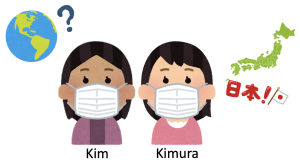Module 8.1 Dialogue
人
Ms. Kimura talks about her nationality
| Language | Script and Translation |
Japanese |
2 木村: 日本です。 3 キム: では、日本人ですね。 4 木村: はい、そうです。 |
Romanization |
1 Kim: Kimura san, go shusshin wa doko desuka?
2 Kimura: Nihon desu. 3 Kim: Dewa, Nihon jin desu ne. 4 Kimura: Hai, sou desu. |
English translation |
1 Kimu: Ms. Kimura, where is your hometown/birthplace?
2 Kimura: It is Japan. 3 Kimu: Then, you are Japanese, right? 4 Kimura: Yes, that’s correct. |
The female voice of Kim: https://ttsmp3.com/text-to-speech/Japanese/
Vocabulary
Grammar Notes
| ご出身はどこですか (goshusshinwa doko desuka?) |
When asking another person where they are from, one can use either of the two options below:
(A) ご出身は (go shusshin wa?), In English, it means, “Your hometown/origin?”
(B) ご出身はどこですか (goshusshinwa doko desuka?) which means “Where is your birthplace/hometown?” Or “As for your birthplace, where is it?”
Option B is an XはYです (X wa Y desu) sentence pattern. That is, X = Y.
X is ご出身 (goshusshin) and Y isどこ (doko).
Your hometown/origin = where?
When replying to the question, replace どこ (doko) with the answer.
| Country + 人 (country jin) |
Country + 人 is used to describe one’s nationality. 人 (jin) means “person” or “people”.
何 (nani) means what.
何人 (nani jin), literally means what person. It means “what nationality” (are you)?”
何人ですか (nani jin desuka), a full sentence, is use to ask “What nationality are you?” or “What is your nationality?”
ひと
きむら
しゅっしん
にほん
にほんじん
じん
なに
なにじん

